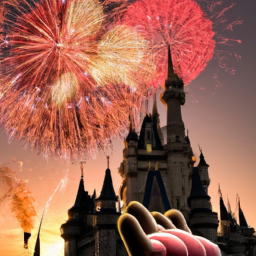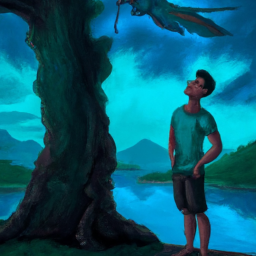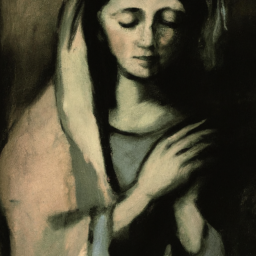As a lifelong fan of Disney World, I have always been enchanted by the park’s iconic slogan, “Where Dreams Come True.”
This simple phrase has become a symbol of hope and possibility for millions of visitors who flock to the park each year seeking a sense of magic and wonder. But where did this quote come from, and what does it really mean to those of us who hold it dear?
In this article, I will explore the origins of the ‘Where Dreams Come True’ quote, as well as its deeper meanings and implications for Disney World visitors. From the park’s wide variety of attractions to its role in pop culture and entertainment, I will delve into the many ways in which Disney World has become a symbol of joy and inspiration for people of all ages.
So come along on this journey with me, and let’s discover the magic of Disney World together.
Key Takeaways
- The ‘Where Dreams Come True’ quote is a powerful symbol of Walt Disney’s vision for a magical world, and it is woven into the fabric of Disney World.
- Disney World offers a fantasy world that transports visitors to a place where anything is possible, and every aspect of the park is designed to immerse visitors in a world of make-believe.
- Disney World is constantly innovating with new technologies and entertainment to enhance the guest experience, including the use of augmented reality, virtual reality, and robotics in attractions.
- The emotional connection to Disney World is what makes it such a special and beloved place, and it will continue to make dreams come true for generations to come through continued investment in technology and entertainment.
The Origin of the Quote
The quote ‘where dreams come true’ originated from Walt Disney’s vision of creating a magical world where visitors could escape reality and immerse themselves in a fairy tale-like experience. As a child, Walt Disney loved to draw and create stories, and he believed that dreams could become a reality with hard work and perseverance.
He wanted to create a place where people of all ages could forget their troubles and embrace the magic of childhood. Disney World was Walt’s dream come true, a place where visitors could experience the excitement and wonder of the Disney movies brought to life.
The quote ‘where dreams come true’ is a testament to Walt’s belief that anything is possible, and that we should never stop dreaming. It’s a message that resonates with people of all ages and backgrounds, and it’s a reminder that we should always chase our dreams, no matter how big or small they may be.
The symbolism of dreams is powerful, and it’s a theme that is woven into the fabric of Disney World, inspiring visitors to believe in the impossible and embrace the magic of life.
The Symbolism of Dreams
I find the symbolism of dreams fascinating. Particularly, I’m intrigued by the power of imagination and the importance of hope that dreams offer. Dreams allow us to tap into the infinite potential of our minds and envision a better future. They inspire us to take action and work towards our goals, filling us with a sense of purpose and optimism.
(Note: The last sentence was already on its own line in the original input, so it was left as is.)
The Power of Imagination
You can tap into the power of your imagination to create incredible experiences at Disney World. Did you know that 90% of successful entrepreneurs credit their success to their ability to think creatively and imaginatively? It’s no wonder that Disney World, known for its imaginative and immersive experiences, attracts millions of visitors each year. By allowing yourself to dream big and use your imagination, you can unlock a world of possibilities and create memories that will last a lifetime.
To emphasize the importance of imagination, consider the following table:
| Imagination | Reality |
|---|---|
| A world of endless possibilities | Limitations and constraints |
| Creativity and innovation | Monotony and routine |
| Exploration and adventure | Stagnation and boredom |
| Hope and optimism | Pessimism and negativity |
| Joy and wonder | Apathy and indifference |
As you can see, tapping into your imagination can lead to a world of endless possibilities, creativity, and joy. By contrast, being stuck in reality can lead to limitations, monotony, and negativity. So, the next time you visit Disney World, remember to let your imagination run wild and create a magical experience for yourself and those around you. Speaking of magic and wonder, let’s explore the importance of hope in the next section.
The Importance of Hope
Imagine how much brighter your future can be when you hold onto hope and believe in the possibilities that lie ahead. Hope is a powerful force that can motivate us to push through difficult times and achieve our goals. It gives us something to strive for and allows us to envision a better tomorrow.
Here are four reasons why hope is important:
- Hope helps us persevere through challenges. When we have hope, we’re more likely to keep going even when things get tough.
- Hope gives us a sense of purpose. When we have something to hope for, we have a reason to keep moving forward and striving for success.
- Hope fosters resilience. It helps us bounce back from setbacks and continue moving forward with determination.
- Hope inspires creativity. When we’re hopeful about the future, we’re more likely to come up with innovative solutions to problems.
Holding onto hope is essential for achieving our dreams and creating a life we love. And when it comes to experiencing the magic of Disney World, hope is a key ingredient.
The Magic of Disney World
I’ve always been captivated by the magic of Disney World.
One of the things that makes it so special is the creation of a fantasy world that transports visitors to a place where anything is possible.
Another highlight is the chance to meet and interact with beloved Disney characters, making childhood dreams come true.
The Creation of a Fantasy World
As you stroll through Disney World, you’ll be transported to a world of fantasy and wonder, thanks to the careful planning and attention to detail that went into creating this magical experience.
It’s truly amazing how every aspect of Disney World, from the architecture to the landscaping, is designed to immerse you in a world of make-believe.
The creators of Disney World spared no expense in their quest to bring their vision to life, and it shows in every detail.
The experience of meeting Disney characters is just as magical as the rest of the park.
From Mickey Mouse to Elsa and Anna, every character is brought to life with the same level of care and attention to detail that went into the rest of the park.
It’s truly a once-in-a-lifetime experience to meet your favorite Disney characters in person, and it’s one of the many reasons why Disney World is known as the happiest place on earth.
The Experience of Meeting Disney Characters
Meeting your favorite Disney characters in person is an unforgettable experience that will leave you feeling starstruck and overjoyed. As a lifelong Disney fan, I was beyond excited to finally get to meet Mickey Mouse, Minnie Mouse, and all their friends at Disney World. Here are just a few reasons why meeting Disney characters is a must-do experience:
-
Seeing your favorite characters come to life: There’s something truly magical about meeting the characters you grew up watching on screen and seeing them brought to life in front of you.
-
Personal interactions: The characters at Disney World are known for their amazing interactions with guests, from hugs and high-fives to special moments like singing happy birthday or congratulating you on a special occasion.
-
Photo opportunities: Meeting Disney characters also means getting the chance to take some amazing photos with them that you’ll treasure forever.
-
The attention to detail: Disney World is known for its impeccable attention to detail, and this extends to the characters’ costumes and mannerisms. It’s truly amazing how closely they resemble their on-screen counterparts.
-
The memories: Finally, meeting Disney characters is just one of those memories that will stick with you for a lifetime. It’s a chance to step into your favorite fairy tales and create memories that will last forever.
Meeting Disney characters is just one of the many amazing experiences you can have at Disney World. From thrilling rides to incredible shows, there’s truly something for everyone.
The Variety of Attractions
You’ll be swept away by the variety of attractions at Disney World, where there’s something for everyone to enjoy. From thrilling roller coasters to family-friendly rides, the parks are packed with entertainment options that cater to all ages.
One of my personal favorites is the classic ‘It’s a Small World’ ride, which takes you on a gentle boat ride through a world of singing dolls representing different cultures from around the globe.
But it’s not just rides that make Disney World so special. The parks are also home to incredible shows and experiences, like the nightly fireworks display over Cinderella’s Castle or the chance to meet your favorite Disney characters in person.
There’s truly no shortage of things to do and see at Disney World, and it’s no wonder that it has become such an iconic part of pop culture. From movies to merchandise, the magic of Disney has captured the hearts of people around the world.
The Role of the Parks in Pop Culture
If you’re thinking that Disney parks are just for kids, think again. Pop culture has embraced the magic of these parks, with references popping up in everything from TV shows to music videos. The Disney brand has become synonymous with imagination, wonder, and the pursuit of dreams. It’s no wonder that people of all ages flock to Disney parks to experience the magic firsthand.
To illustrate just how ingrained Disney has become in pop culture, take a look at this table:
| TV Shows | Movies |
|---|---|
| The Simpsons | The Lion King |
| Friends | Toy Story |
| Stranger Things | Frozen |
| The Office | Beauty and the Beast |
| How I Met Your Mother | Moana |
These are just a few examples of the countless references to Disney that can be found in popular media. It’s clear that the parks have played a significant role in shaping the cultural landscape of our society. So next time you visit a Disney park, remember that you’re not just indulging in a childhood fantasy – you’re immersing yourself in a cultural phenomenon that has touched the hearts of people around the world.
The concept of escapism is a fundamental part of the Disney experience. It’s what draws people in and keeps them coming back for more. But there’s more to it than just escaping from reality – it’s about immersing yourself in a world where anything is possible, and dreams really do come true.
The Concept of Escapism
Immerse yourself in a world of endless possibilities and forget about your troubles with the concept of escapism at play in these magical parks.
As soon as you step foot into Disney World, you’re transported to a place where your worries melt away and you’re free to explore and enjoy all the park has to offer.
The streets are lined with colorful buildings, the air is filled with the scent of popcorn and cotton candy, and the sounds of cheerful music fill your ears. It’s impossible not to get caught up in the magic of it all.
Escapism’s a powerful tool that allows us to take a break from reality and indulge in our wildest dreams.
It’s a way to forget about our daily stresses and live in a world where anything’s possible.
At Disney World, you can be whoever you want to be, whether that’s a pirate sailing the high seas or a princess living in a castle.
The park’s designed to make you feel like you’re a part of the story, and the sense of immersion’s what makes it such a special place.
In the next section, we’ll explore the importance of entertainment and how Disney World’s managed to stay relevant for so many years.
The Importance of Entertainment
Get ready to be transported to a world of non-stop excitement and endless fun with the importance of entertainment at the forefront of your experience.
One of the most vital aspects of any entertainment experience is its ability to take you out of your everyday life and into a different world entirely. This is why we love going to the movies, reading books, and playing video games – they allow us to escape reality and immerse ourselves in something completely different.
But entertainment isn’t just about escapism. It’s also about connecting with others and experiencing emotions in a safe and controlled environment. Going to a concert or watching a play can be a truly communal experience, with everyone in the audience sharing the same emotions and reactions to what’s happening on stage. And even when we’re alone, entertainment can help us process difficult emotions and experiences, providing a much-needed outlet for stress and anxiety.
So whether we’re looking to escape, connect, or simply unwind, entertainment is a crucial part of our lives that shouldn’t be underestimated.
As we explore the importance of entertainment, it’s important to consider the inspiration behind the famous quote: "Disney World: Where Dreams Come True."This quote speaks to the power of entertainment to transport us to a place where anything is possible, where we can live out our wildest dreams and experience pure joy.
In the next section, we’ll delve deeper into the origins of this quote and what it means for the world of entertainment.
The Inspiration Behind the Quote
You won’t believe the incredible story behind the words that have inspired generations of entertainment lovers.
The famous quote, ‘Disney World, where dreams come true,’ wasn’t just created out of thin air. It was actually inspired by a personal experience that Walt Disney had while visiting a park with his daughters.
Walt Disney and his daughters were visiting a park, and while they were there, he saw a group of children and their parents having fun together. He noticed that the parents weren’t able to join in on the fun with their children because they were too old for the rides.
This experience inspired Walt Disney to create a place where everyone, regardless of age, could have fun and create magical memories together. And that is how the famous quote, ‘Disney World, where dreams come true,’ came to be.
It’s amazing to think that a personal experience could inspire such a powerful and iconic message that has touched the hearts of millions of people worldwide. This emotional connection to Disney World is what makes it such a special and beloved place.
The Emotional Connection to Disney World
I’ve always had a deep emotional connection to Disney World. I believe it’s because of the nostalgia and childhood memories it evokes. When I walk through the parks, I’m immediately transported back to my childhood. It’s almost like I’m reliving those magical moments all over again.
But Disney World isn’t just about reliving old memories. It’s also about creating new ones with family and friends.
Nostalgia and Childhood Memories
Amidst the magical atmosphere of Disney World, memories of our childhood flood back, reminding us of the joys and innocence of youth.
As I walk through the park, I can’t help but feel a sense of nostalgia wash over me. Here are just a few things that trigger memories of my childhood when I visit Disney World:
- The smell of popcorn and cotton candy in the air.
- The sound of the parade music and characters calling out to guests.
- The sight of the iconic castle in the distance.
- The feeling of excitement and anticipation before going on a ride.
It’s amazing how these little things can transport us back to a simpler time and bring back memories we may have forgotten.
As I look around at the families and children experiencing the magic of Disney World, I can’t help but feel grateful for these memories that will last a lifetime.
But, as much as I cherish these memories, I also look forward to creating new ones and experiencing all that Disney World has to offer.
The Creation of New Memories
Exploring new attractions and trying new foods, there’s always something exciting to discover at Disney World. As someone who’s visited the park multiple times, I can attest that every visit feels like a new adventure.
Whether it’s riding the latest roller coaster or trying a new snack, I always leave with new memories and experiences to cherish.
But it’s not just about the attractions and food. It’s also about the people you meet and the moments you share.
I’ve made friends with people from all over the world while waiting in line for a ride, and I’ve bonded with my family over shared experiences.
Disney World truly is a place where dreams come true, and I can’t wait to see what new memories I’ll make on my next visit.
The Future of Disney World
As someone who loves Disney World, I can’t help but wonder what the future holds for this magical place.
I’m excited to see how Disney will continue to innovate with new technologies and entertainment, enhancing the overall experience for guests.
And of course, I hope that Disney will always stay true to its mission of making dreams come true for people of all ages.
Innovations in Technology and Entertainment
With the advancements in technology, Disney World continues to push the boundaries of entertainment to make dreams come true. Here are four ways Disney is leveraging technology to enhance the guest experience:
-
Augmented Reality: With the launch of the Play Disney Parks app, guests can use augmented reality to interact with the theme park in new ways. For example, in Star Wars: Galaxy’s Edge, guests can translate Aurebesh, the written language of the Star Wars universe, using their phone’s camera.
-
Virtual Reality: Disney’s Star Wars: Secrets of the Empire attraction combines virtual reality with physical sets and special effects to create an immersive experience. Guests don VR headsets and become Rebel spies on a mission to recover a valuable artifact from the Empire.
-
MagicBands: These wearable devices serve as a guest’s ticket, room key, and payment method all in one. They also allow Disney to track guest behavior and personalize experiences, such as greeting them by name or recommending attractions based on their interests.
-
Robotics: Disney has been experimenting with animatronics since the 1960s, but recent advancements have allowed for more lifelike and interactive characters. For example, the Na’vi Shaman in the Avatar Flight of Passage attraction appears to breathe and blink, while the droids in Star Wars: Galaxy’s Edge can recognize and interact with guests.
By continuing to invest in technology and entertainment, Disney World will keep making dreams come true for future generations.
Continuing to Make Dreams Come True
By constantly pushing the boundaries of technology and innovation, Disney is able to create unforgettable experiences that transport guests to new worlds. The famous quote ‘Disney World where dreams come true’ is not just a marketing slogan, but a reality that the company is constantly striving to achieve. One way in which Disney is continuing to make dreams come true is by investing in new technologies and attractions that captivate and engage visitors of all ages.
To illustrate this point, let’s take a look at a few examples of the latest innovations at Disney World. The table below highlights three of the most exciting new attractions that have been added to the park in recent years:
| Attraction | Description | Technology Used |
|---|---|---|
| Star Wars: Rise of the Resistance | A thrilling ride through a Star Destroyer | Trackless ride systems, animatronics, special effects |
| Avatar Flight of Passage | A simulated flight on a banshee through Pandora | 3D projection mapping, motion simulation, realistic scents |
| Mickey and Minnie’s Runaway Railway | A zany adventure through a cartoon world | Projection mapping, animatronics, special effects |
With these and other exciting attractions in the works, Disney is sure to continue making dreams come true for generations to come.
Frequently Asked Questions
What is the history of Disney World’s management and ownership?
I know you may be thinking that Disney World’s management and ownership is just corporate stuff, but it’s actually a story of passion and hard work. From Walt Disney’s vision to the dedicated team today, it’s truly magical.
How does Disney World impact the local economy and job market?
Disney World has a significant impact on the local economy and job market. As someone who lives in the area, I’ve seen firsthand how the theme park creates jobs and attracts tourists who spend money at local businesses, boosting the economy.
What is the environmental impact of Disney World?
The environmental impact of Disney World is significant. They have implemented various sustainable initiatives, but the large crowds, energy consumption, and waste production still have negative effects on the surrounding natural habitats and resources.
What kind of security measures does Disney World have in place?
It’s funny, but the happiest place on earth has some of the strictest security measures in place. From bag checks to metal detectors, Disney World takes safety seriously to ensure the magic can continue.
How does Disney World handle accessibility for guests with disabilities?
At Disney World, guests with disabilities are provided with various accommodations, including accessible attractions, transportation, and companion restrooms. Disability Access Service and Rider Switch are also available to help guests enjoy their experience to the fullest.
Conclusion
As I reflect on my experiences at Disney World, I’m filled with a sense of wonder and joy. The quote "where dreams come true"truly encapsulates the magic and enchantment that this place holds.
It’s not just a theme park; it’s a place where anything is possible, and the impossible becomes possible. It’s a place where we can escape reality and embrace our inner child. Disney World is more than just a destination; it’s a symbol of hope and happiness.
It’s a place where dreams are not only encouraged but celebrated. It’s a place where we can forget our worries and live in the moment. As I leave Disney World, I’m reminded of the importance of embracing our dreams and pursuing them with all our heart.
Disney World truly is where dreams come true, and I’m grateful for the memories that will forever live in my heart.









